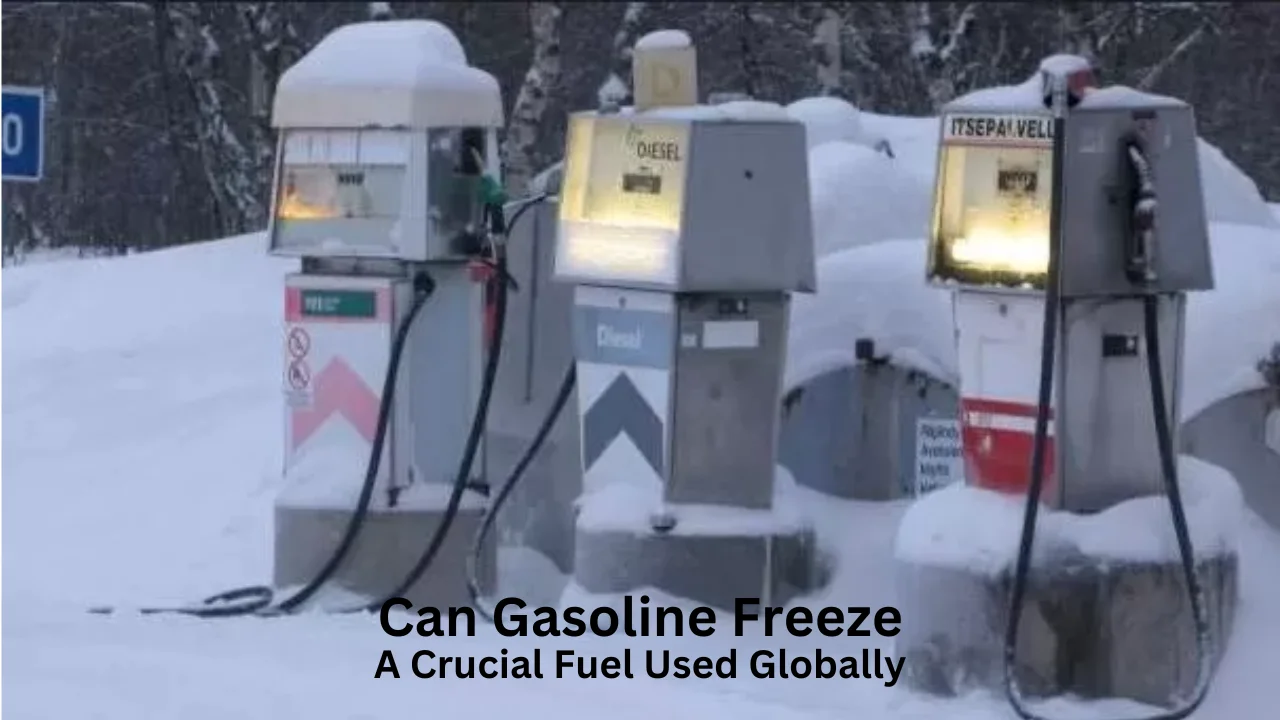Can Gasoline Freeze? A Crucial Fuel Used Globally

Gasoline is a crucial fuel used globally for powering vehicles and machinery, but have you ever wondered, “can gasoline freeze?” The question often arises, especially in colder climates where subzero temperatures are common. While gasoline freezing might seem like a potential issue, it is a rare occurrence due to the unique properties of this fuel. Gasoline is a complex mixture of hydrocarbons, each with different freezing points, making the freezing process non-uniform and requiring extremely low temperatures.
What is The Freezing Point of Gasoline
To address the question, “can gasoline freeze,” we must first understand its composition. Gasoline consists of various hydrocarbons like octane, heptane, and others, with freezing points ranging between -100°F and -150°F (-73°C to -101°C). These temperatures are far lower than those found in even the harshest winter climates. In most real-world conditions, gasoline does not freeze in the same way as water, which turns into a solid block of ice at 32°F (0°C). Instead, in extreme cold, gasoline may thicken or lose some of its fluidity, which can affect performance but does not render it entirely unusable.
Why Gasoline Rarely Freezes
The question, “can gasoline freeze,” might stem from concerns about vehicle performance in cold weather. Gasoline’s low freezing point makes freezing an unlikely event under natural conditions. However, certain impurities, like water, in the fuel system can freeze at higher temperatures, leading to blockages in fuel lines or filters. This phenomenon is more common than gasoline freezing itself and is one reason drivers in colder regions use additives to prevent freezing in their fuel systems. These additives help to lower the freezing point of water and keep gasoline flowing smoothly.
Read Also: Lorice Washington Net Worth, Early Life, Education and career
Gasoline in Extreme Conditions
In extremely cold environments, such as the Arctic, where temperatures can plummet below -100°F (-73°C), the question “can gasoline freeze” becomes relevant. At these extreme temperatures, certain hydrocarbons in gasoline may begin to crystallize, reducing its fluidity. This is why specialized fuels with additives are often used in such conditions to ensure reliable performance. Even in these extreme cases, freezing gasoline entirely into a solid state remains a rare event.
Effects of Cold Weather on Gasoline
While freezing may not be a common issue, cold weather can still impact gasoline in other ways. Low temperatures can cause the fuel to thicken, which might lead to reduced efficiency in the engine’s fuel delivery system. Additionally, any water present in the gasoline can freeze, creating blockages that can disrupt fuel flow. This is why fuel additives designed for cold climates are popular, as they help prevent water-related issues and maintain the fuel’s usability.
| Property | Water | Gasoline |
|---|---|---|
| Freezing Point | 32°F (0°C) | -100°F to -150°F |
| Composition | H2O | Hydrocarbons |
| Freezing Behavior | Uniform solid | Non-uniform thickening |
Preventing Issues with Gasoline in Cold Weather
For those living in cold climates, preventing fuel-related problems is essential. Although the answer to “can gasoline freeze” is largely “no” under normal circumstances, cold weather precautions are still necessary. Ensuring that your vehicle’s fuel system is free of water is a critical step. Water in fuel can freeze even at temperatures above gasoline’s freezing point, causing clogs and other issues. Fuel stabilizers and antifreeze additives are also recommended, especially for vehicles stored outdoors or in unheated garages during winter months.
Myths and Facts About Gasoline Freezing
One common myth is that gasoline can freeze in ordinary winter conditions. The reality, as explained earlier, is that the freezing point of gasoline is far lower than most natural temperatures. Another misconception is that thickened gasoline equates to freezing. In truth, gasoline may become less viscous in cold weather, but this is not the same as freezing. Understanding these distinctions helps dispel myths and ensures drivers can make informed decisions about their vehicles in winter.
Real-World Examples about “can gasoline freeze”
In practical terms to find the answer of the question “can gasoline freeze”, incidents of gasoline freezing are virtually unheard of in typical climates. For example, in North America, where winter temperatures can drop to -40°F (-40°C) in some areas, gasoline remains liquid and functional. However, in laboratory settings or controlled environments where temperatures can be lowered below -100°F, researchers have observed gasoline beginning to crystallize. Such experiments confirm that while the answer to “can gasoline freeze” is technically yes, the conditions required are far beyond what most people will ever experience.
Uses of Gasoline
Fuel for Vehicles
One of the primary uses of gasoline is as a fuel for internal combustion engines in cars, motorcycles, and light trucks. This fuel provides the energy required to move vehicles efficiently and reliably. However, in extremely cold climates, people often wonder, can gasoline freeze? While freezing is rare, cold temperatures can affect its performance, leading to slightly reduced flow efficiency.
Powering Small Engines
Gasoline also powers small engines found in lawnmowers, chainsaws, and leaf blowers. These tools rely on gasoline for efficient operation, making it a popular choice for landscaping and maintenance tasks. A common concern when storing such tools in winter is, can gasoline freeze? The answer remains that it is unlikely in most environments, but additives can prevent water in gasoline from freezing, ensuring optimal performance.
Generating Electricity
Gasoline-powered generators provide backup electricity during outages or in remote areas. These machines depend on gasoline for reliability and portability. During cold seasons, users may question, can gasoline freeze? While freezing temperatures don’t usually affect gasoline, impurities like water can freeze, leading to generator malfunctions without proper maintenance.
Recreational Vehicles and Equipment
Gasoline is crucial for recreational vehicles like jet skis, snowmobiles, and ATVs, ensuring smooth performance in diverse terrains. Enthusiasts often store their vehicles during winter and ask, can gasoline freeze? While gasoline itself won’t freeze under typical conditions, ensuring that fuel tanks are sealed properly can prevent issues like water freezing in the fuel.
Industrial and Commercial Applications
In industrial and commercial settings, gasoline is used to power small construction equipment and forklifts. Its high energy density and portability make it a preferred fuel for such applications. However, in colder climates, the question arises: can gasoline freeze? While freezing is improbable, ensuring that storage tanks are free from water contamination is critical to avoid complications.
Agriculture
Agriculture relies on gasoline to power equipment like tractors, pumps, and sprayers for smaller operations. In rural areas, where cold weather is common, farmers may wonder, can gasoline freeze? Though freezing temperatures rarely affect gasoline, precautions like fuel stabilizers help maintain its efficiency during winter months.
Aviation (Small Aircraft)
Certain small aircraft rely on aviation gasoline (avgas) for their engines. This specialized form of gasoline is crucial for safety and performance in private aviation. During extreme conditions at high altitudes or in polar regions, pilots might think, can gasoline freeze? While it’s unlikely, aviation fuels are refined with additives to ensure they perform well in such environments.
Read Also: Chantal Nchako: Cameroonian Actress and Director
Key aspects of “Can Gasoline Freeze?”
| Aspect | Details |
|---|---|
| Freezing Point | Gasoline freezes between -100°F to -150°F (-73°C to -101°C), depending on its specific composition. |
| Composition | A mixture of hydrocarbons, each with different freezing points. |
| Natural Conditions | Freezing is unlikely under normal winter conditions, as temperatures rarely drop low enough. |
| Cold Weather Effects | Gasoline thickens or loses fluidity, which can affect fuel performance but doesn’t solidify. |
| Impact of Impurities | Water in gasoline can freeze at 32°F (0°C), causing fuel line blockages in cold weather. |
| Preventive Measures | Use fuel additives to prevent water-related freezing and maintain smooth fuel flow. |
| Extreme Conditions | Freezing can occur in temperatures below -100°F, but this is rare and usually in controlled environments. |
| Myths vs. Facts | Gasoline doesn’t freeze in ordinary winter; thickening isn’t the same as freezing. |
Conclusion
So, can gasoline freeze? While it is theoretically possible, it is exceedingly rare in natural conditions due to the extremely low temperatures required. Gasoline’s unique composition ensures that it remains usable even in subzero climates, making it a reliable fuel for vehicles and machinery worldwide. However, cold weather can still impact its performance, primarily through water contamination or thickening at low temperatures. By taking preventive measures like using fuel additives and maintaining a clean fuel system, drivers can ensure their vehicles operate smoothly, even in harsh winter conditions.





